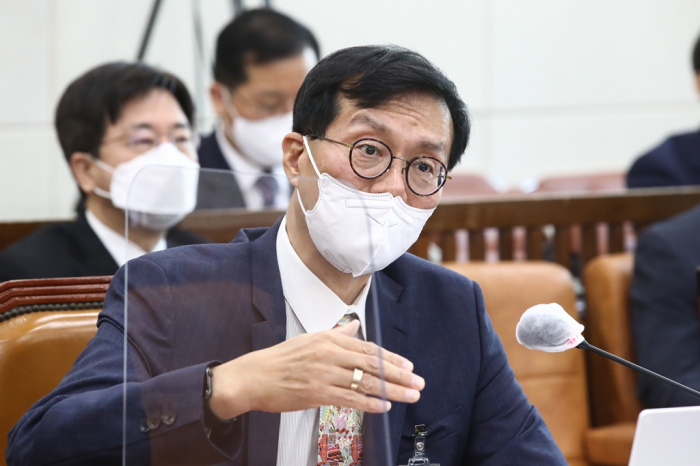South Korea’s lawmakers gave the nod to the nomination of veteran International Monetary Fund official Rhee Chang-yong as the country’s new central bank chief on Tuesday with the authorities doing their utmost to curb inflation in Asia’s fourth-largest economy.
Rhee pledged to continue the Bank of Korea’s policy to stabilize prices although he warned against steep interest rate hikes, given the risks to economic growth, during a parliamentary confirmation hearing earlier in the day.
“We will have to fight against inflation for the next couple of years,” Rhee told lawmakers of the strategy and finance committee. “But Korea’s economic growth is not as strong as that of the US. We have to be more cautious over the pace (of rate increases) than the US.”
In the longer term, the central bank needs to consider lower economic growth on aging, while curbing inflation in the short term, he said.
After the remarks, South Korea’s government bond yields dipped across the board with the highly liquid three-year debt yield down 0.9 basis point to 2.782%.
HIGHER US INTEREST RATES THAN KOREAN BORROWING COSTSRhee said US interest rates may be higher than South Korean borrowing costs as the Federal Reserve is expected to aggressively tighten monetary policy.
“US inflation is more than double of ours while the economic growth is forecast at around mid-4%, leaving room for quick rate hikes,” Rhee said. “The reversal in the rate differentials will be worrisome, but we have to endure it.”
US inflation surged to 8.5% in March, the highest since 1981, while
South Korea’s consumer prices rose 4.1% last month, the largest growth since 2011.Rhee saw little risk of massive capital outflows in the short term on higher US interest rates as South Korea’s economic fundamentals remained strong.
But the South Korean won could weaken further, adding to upward pressure on inflation, Rhee said.
“We need a fine-tuned policy that does not widen the differential too much but adjust the pace well in consideration of the global economic situation,” he said.
Rhee will closely watch the trend of risks to both inflation and economic growth in consideration of heightened uncertainties for the management of the monetary policy.
ACCELERATING INFLATIONRhee said the
BOK raised the base interest rate to 1.50% last week as inflation risks were more serious than downside risks to the economy.
Inflation has been accelerating mainly due to higher oil prices amid the war in Ukraine and the global supply disruption on the COVID-19, he said.
“Inflation expectations are rising, so I will focus on keeping prices from rising further with signals even if it is not popular,” he stressed.
Meanwhile, he said South Korea needs to consider raising taxes as the country’s sovereign debt is expected to quickly increase further.
“We can alleviate income equality by using funds raised through a hike in VAT for welfare expenditures for the vulnerable,” he said, referring to value-added tax. The country’s standard VAT rate is 10% currently.
The comment came as President-elect
Yoon Suk-yeol is seeking a supplementary budget of up to 50 trillion won ($40 billion) to support small companies and the self-employed hit by COVID-19.
The country’s sovereign debt is expected to exceed the 1,000 trillion won mark for the first time this year.Write to Mi-Hyun Jo at
mwise@hankyung.comJongwoo Cheon edited this article.




